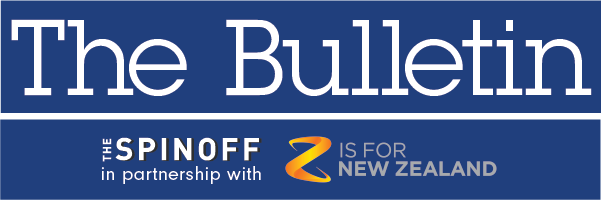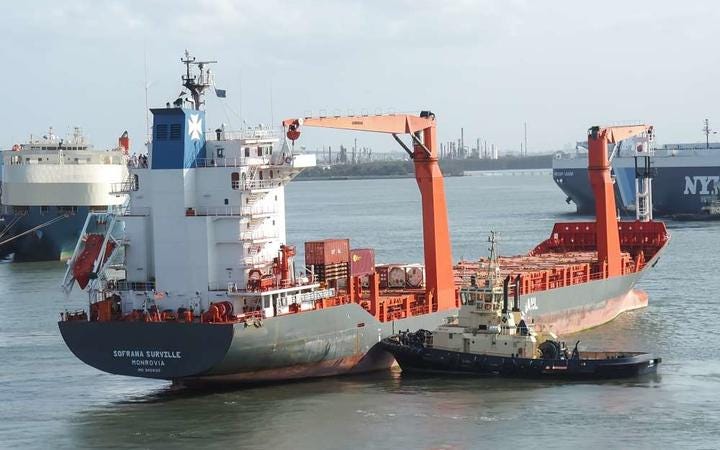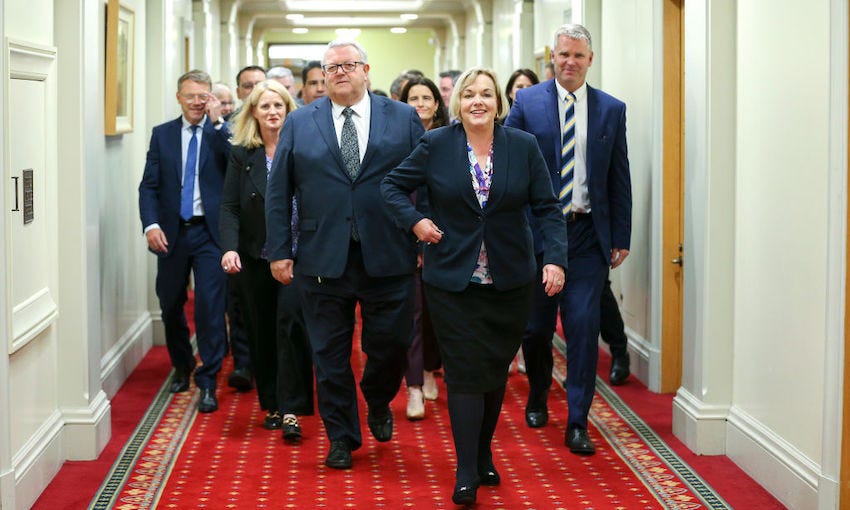Covid's back in the community – but has it spread any further?
We should know today, but some big questions will remain.

Good morning and welcome to The Bulletin for Friday October 23 by Alice Neville, filling in for Alex Braae, for The Spinoff. Presented in partnership with Z Energy.
In today’s edition: What we know – and what we don’t – about the Covid-19 community cases; an America’s Cup spat threatens how Aucklanders can watch; and late election donations are revealed.

Image: The Sofrana Surville (RNZ)
It’s now been five days since we learnt that Covid-19 was back in the community, and the missing pieces of the puzzle are gradually falling into place. With hundreds of community tests taking place in Auckland’s Greenhithe suburb yesterday – following the news a man who went on to test positive spent an evening in a pub there while he may have been infectious – we should have a good idea today if it’s spread any further. Some pretty big questions still remain, however.
Jamie Morton of the Herald has delved into how New Zealand’s 1,530th case of Covid-19 came to be, and highlights a point earlier covered by RNZ: the 27-year-old marine technician boarded the Sofrana Surville on Tuesday, October 13, the same day as eight crew members who had flown in from the Philippines a few days before, and had isolated at the Novotel facility for only “a brief period”. None had been tested. Public health experts are asking why crew in transit like these aren’t subject to the usual border rules, and the Ministry of Health has promised to review its measures. All crew of the Sofrana Surville, which is currently moored off Queensland, have now been tested, and this afternoon results revealed three crew members were at different stages of infection – something health minister Chris Hipkins yesterday told Checkpoint “lends itself to the idea that the virus had been circulating around that ship”.
On Wednesday, it emerged that two workplace contacts of the technician had tested positive. While one was a close contact and already in quarantine, the other was considered only a casual contact as he had spent just a few minutes in the same room with the technician on the Friday. Health experts such as Siouxsie Wiles had expressed surprise that someone could be infected in such a brief period.

As Morton reports, this man had in fact been tested and returned a negative test result on Sunday but by Tuesday he was feeling sick, so got retested – and it came back positive. As our live updates yesterday reported, however, Ashley Bloomfield revealed the man also boarded the Sofrana Surville on October 12, so may have been infected there, rather than through his subsequent contact with the technician on land. This would also suggest that Covid-19 was already on board the ship before the arrival of the eight crew from the Philippines, who didn’t board until the day following. Yet another possibility is that the casual contact (let’s call him, as Hipkins did on Checkpoint last night, case C) was infected by the close contact (case B) of the original case (the technician, case A), who Hipkins said had spent a longer period of time with case C on the Friday afternoon.
On Wednesday night, Auckland Regional Public Health alerted the public that a case had visited The Malt pub in Greenhithe on the Friday night, the day before the technician returned his positive result, when no one was any the wiser. It appears that this was case C, and ARPHS said that while he wasn’t symptomatic, the man may have been infectious, so anyone who was at the pub that night should get tested and self-isolate for 14 days. The man’s contact with the technician (case A) was that very morning, so if that was indeed the source of infection, it would have been very early in the incubation stage of the virus, and even earlier if the source was case B. If he had caught it when on board the Sofrana Surville, however, the virus would have been incubating for a few more days.
The Ministry of Health, which initially said anyone who was at the pub at the same time as case C should be tested, is now advising household contacts of those people to be tested as well. Hipkins defended the change in messaging, telling Checkpoint that new information was coming to light all the time. He didn’t know how many people had been tested at the pop-up centres in Greenhithe yesterday, but the Herald said by early afternoon, there had been around 200. There were reports of waits of up to three hours. Presumably the results will come back today, and we’ll hear if any are positive – keep an eye on our lives updates for that one. Last night the Herald reported that the man who had been at The Malt had also been to a fishing supplies store in Gulf Harbour twice on the Sunday, but the visit was deemed low risk, and a Browns Bay gym had closed for deep cleaning following a visit from a Covid case on Saturday.
With all this uncertainty around the exact source of infection and the potential spread, it’s probably understandable that the government is urging people to take extra precautions like wearing masks on public transport – what Bloomfield referred to yesterday as “level one plus”. It’s not a legal requirement, however, and many of us seem reluctant to wear them unless we absolutely have to. Hipkins has asked Bloomfield to present evidence for and against a national mandate to wear masks on public transport and flights under all alert levels, and Bloomfield said work was under way on preparing it.
The America’s Cup arbitration panel has ruled out the use of two inner-harbour courses for the Prada Cup challenger series of races to be run between January 15 and February 22 next year, which effectively ends the public’s ability to watch the races from shore. The decision has outraged Team New Zealand, which blames a campaign being waged by challenger Luna Rossa. It’s a “typically confused and bitter America's Cup spat”, write Chris Rattue and Matt Brown in the Herald. NZ yachtsman Brad Butterworth, who now works for Luna Rossa, told the Herald that as the challengers would not have access to those areas during the Prada Cup, they handed a tactical advantage to the home team defenders, and the British and American teams supported the decision, which he said was made without the knowledge of the challengers. "It's pretty obvious to everybody who is wrong here," Butterworth said, blaming Team New Zealand. "It's a bit of bad behaviour and they've been caught out by the arbitration committee.”
Team New Zealand boss Grant Dalton, meanwhile, told Stuff Luna Rossa would “do anything to take the cup from New Zealand, and if that means hurting the event in the process, so be it”. Ports of Auckland spokesperson Matt Ball told BusinessDesk’s Pattrick Smellie the decision to remove the courses from the Prada Cup was to reduce disruption to shipping. Auckland mayor Phil Goff has asked the teams to work together to find a solution that makes the event more accessible to Aucklanders.
A complainant in the sexual assault allegations against a group of Wellington musicians has spoken to Sophie Cornish and Mandy Te of Stuff, saying the process of filing a complaint with police of historical indecent assault had made her feel stronger, and she was encouraged by the support she had received from police and other complainants. “I feel like this massive weight has been lifted off my shoulders,” she said, calling for others to come forward and go to the police. Multiple allegations were made public on social media earlier this week and police have opened an investigation, dubbed Operation Emerald.
Anyone who has information can contact police via 105, and reference Operation Emerald. If you need support, visit confidential sexual harm helpline safetotalk.co.nz.
Donations disclosed in the last weeks of the election campaign reveal Labour went ahead with its usual art auction fundraiser, despite questions about how it was disclosing the donations, reports the Herald’s Claire Trevett and Jason Wall. There has been speculation the SFO probe into 2017 donations to Labour could relate to the art auctions, and electoral law specialist Andrew Geddis told the Herald the law in this area should be tightened up to disclose who buys the artworks.
Late donations also revealed Winston Peters – or someone with the same initials – appeared to have lent $60,000 to New Zealand First, Sam Sachdeva reported for Newsroom.
RNZ’s Meriana Johnsen has been reporting from the Waitangi Tribunal hearing into why there is a disproportionate number of tamariki Māori in state care. Yesterday, the Māori Women's Welfare League told the tribunal that Māori initiatives to reduce the number of tamariki in their care have been short-lived because the Crown has all the control. Earlier in the day, the National Urban Māori Authority called for Oranga Tamariki to make way for a Māori-led “Mokopuna Authority”.
We’d love it if you, beloved Bulletin reader, to take part in our latest audience survey, conducted by UMR research.
It’ll help us take the pulse of New Zealand across a range of political and social issues, and will be used to inform what stories we tell on The Spinoff.
It shouldn’t take more than 10 minutes of your time and will help us keep producing great journalism, free to everyone. Thanks!
Got some feedback about The Bulletin, or anything in the news?
Drop us a line at thebulletin@thespinoff.co.nz

Right now on The Spinoff: Ben Thomas asks what’s next for the National Party, finding one small ray of light. UK-based NZ journalist Richard Adams writes about his life as a human guinea pig on the Oxford Covid vaccine trial. Former Green MP Kevin Hague urges his former party to work with Labour for nature’s sake. Duncan Greive reviews Borat 2, in which Sacha Baron-Cohen’s most successful character returns to a pandemic-stricken middle America. Simon Day writes about anxiety and depression in new dads. Alex Braae compares two minor parties that polled similarly on election day but are ideologically poles apart. Michael Andrew looks at how permanently low interest rates are killing the home ownership dream for many. And Leonie Hayden reviews great new Rose Matafeo flick Baby Done.
For a feature today, check out Emma Espiner’s speech to at Waitohu: Women Reclaiming The Ink, a celebration of mana wāhine hosted by the National Library, republished in full by Newsroom. It’s about Māori women taking ownership of the written word and is well worth a read.
That's it for The Bulletin. If you want to support the work we do at The Spinoff, please check out our membership programme




